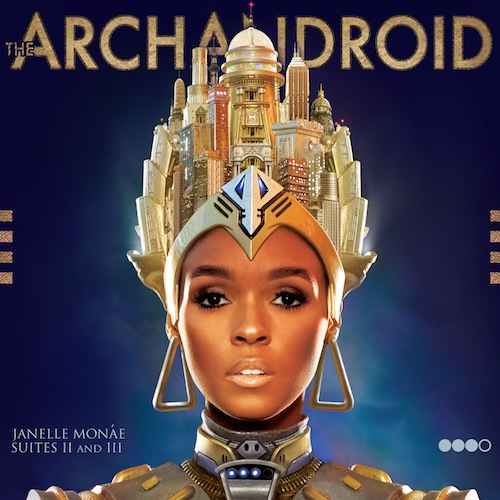It’s always refreshing when an entirely new talent breaks through and does so without compromising his or her artistic integrity. Janelle Monáe is one such talent. After catching the eyes and ears of Big Boi and delivering a critically-acclaimed concept EP in 2007, Monáe signed to Diddy’s Bad Boy Records, allowing her to record a proper follow-up in 2010, and worrying her growing fanbase in the process, which feared she’d change…or sell out…or whatever it is that people always complain about when a new talent finds fame. Thankfully, their fears were unfounded.
Her music is comprised of suites. The EP was the first one; The ArchAndroid is comprised of two more. As for their conceptual angle? Allmusic.com reports that “Monáe was genoraped in the 28th century, sent back to the 21st century, and had her organic compounds cloned and re-purposed for the existence of ArchAndroid Cindi Mayweather, whose directive is to liberate Metropolis from a secret society of oppressors.”
Um, yeah. About that – unless you’re following along with the liner notes and really paying attention to the lyrics and music videos’ storytelling techniques, the Metropolis infatuation – as admirable and intriguing as it may be for film and sci-fi fans – isn’t going to matter much. You can listen to a song like “Tightrope” and take it on its own terms (as a reflection upon the thin line between commercial appeal and obscurity) without asking where the androids fit in.
That’s certainly not to undermine the album’s narrative, because if you really delve into this record, you’ll start wanting to go along with it. Fortunately, then, this is one of the better albums released this year, and the kind you’ll want to revisit quite often.
Monáe has a great, soulful voice, but she’s also capable of adjusting to other styles – whether rapping or rocking out, she never seems strained or uncomfortable. Because the album is seventy minutes long, it does feel a bit like a journey, and not every lunge forward is without its missteps; the of Montreal collaboration, “Make the Bus,” is easily the worst song, both garish and annoying (though, admittedly, it’s more so because of Kevin Barnes’ misplaced vocals than anything Monáe brings to the table).
But, perhaps because the record does feel so overwhelming, the occasional mistake doesn’t seem to make much of a difference. On albums laden with singles and throwaway tracks, this is often quite different – you skip the bad tracks and move on – but, with The ArchAndroid, you’re left with the impression that, in spite of their flaws, the lesser moments are necessary. It’s one of those rare modern concept albums that actually works, and at the risk of sounding clichéd, it’s something you want to start at from the beginning and finish accordingly.
The record’s high points remind you of genre-bending modern pop artists like Prince or Michael Jackson in their prime; Monáe has such a firm grasp of the territories she’s working in that not for one moment do you remember that it’s her first LP, and you never feel like she’s in over her head with any of the artistic choices she makes.
One of the better tracks, “Say You’ll Go,” is a haunting ballad that suddenly introduces a Debussy sample at the end – the sort of confident move that could be a complete misfire for many artists, but which Monáe pulls off entirely. It’s easy to indulge in lazy hyperbole when you’re wowed by the introduction of an impressive new talent, but somehow, it doesn’t seem unfair to assume, based on the merits of her album, that Monáe may be one of the fresh artists to help redefine pop music in the new decade. And even if she doesn’t – even if this album doesn’t sell much and she never quite breaks into the mainstream – at least she’s walking the tightrope and doing her own thing on her own terms.


